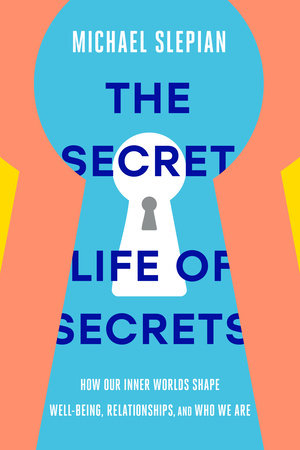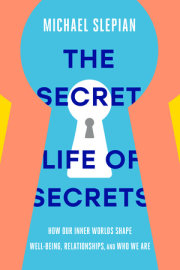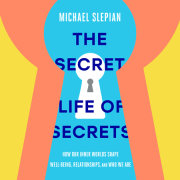Chapter 1
What Is a Secret?The very first scene of The Sopranos, the HBO show that set the course for a new age of television, begins with a secret. Tony Soprano is sitting in a waiting room and he is looking around the room. It’s quiet enough to hear a clock ticking, which makes the sound of a suddenly opened door startling. Dr. Melfi calls Tony into her office, he follows her in, and they both take a seat. Tony has the posture of somebody who is trying to look relaxed more than someone who is truly at ease. He looks to Dr. Melfi expectantly. She returns his gaze. The silence is awkward and Tony taps his fingers to fill it. He breaks eye contact, looks up and away and then looks back into her eyes, and breathes in deeply.
Tony Soprano is seeing a therapist. He doesn’t want a soul to know. If any of his pals and business associates were to learn of it, they would think less of him; he is sure of it. It would make him look soft and weak; hardly what one would want to project as the head of an organized crime ring. Tony knows there is little risk of his secret being discovered. After all, in his line of work, secrecy is a job requirement; it’s even central to the oath of Omertà, the code of silence that criminal organizations have upheld for centuries. And it’s not like “Are you seeing a therapist?” is a question that comes up in everyday conversation. Yet the secret weighs heavily on him. Why was this secret so burdensome for Tony?
Psychologists have long believed that secrets take a toll on our mental and physical health, but the question of why has proved difficult to answer. For years, most researchers assumed that the act of hiding our secrets was what made secrets harmful to our health. The classic study design placed research participants in conversation with another person, from whom they were asked to conceal a secret. Often, the other person in the study was instructed to ask questions about the very secret the participant was instructed to hide. But does this situation capture the full scope of how people experience their secrets?
Defining Secrecy
“Nothing is harder than living with a secret that can’t be spoken.” Edward Snowden wasn’t worried about people asking about his secret, but rather was worried about how he could safely get his secret out. Snowden discovered that the National Security Agency was secretly engaging in mass global surveillance. “They could just spy on the world without telling a soul,” he wrote in his autobiography. Snowden believed that the program undermined the very purpose of the NSA, which was to protect civil liberties, not violate them.
Snowden decided to become a whistleblower, but this presented two problems. First, there was the scope and complexity of the surveillance system. For the information to be credible, Snowden needed to reveal how the surveillance program worked. “The way to reveal a secret program might have been merely to describe its existence, but the way to reveal programmatic secrecy was to describe its workings,” he later wrote. “This required documents, the agency’s actual files—as many as necessary to expose the scope of the abuse,” which brings us to the second problem. The U.S. government does not take kindly toward the illegal leaking of classified information. “I knew that disclosing even one PDF would be enough to earn me prison.”
Every move had to go undetected. While the NSA computers in use sent data processing and storage to the cloud, leaving digital paper trails, Snowden realized that the old NSA computers no longer in use, just sitting in an office discarded, could not be so easily tracked. But it would look strange if anyone saw him using those ancient computers, and so he copied the critical files at odd hours under the cover of darkness. “I’d be sweating, seeing shadows and hearing footsteps around every corner.” He downloaded files to a tiny memory card—one too small to set off any metal detectors—which he carried out of the building hidden in his pocket and, on one occasion, inside his Rubik’s Cube. “In other attempts, I carried a card in my sock, or, at my most paranoid, in my cheek, so I could swallow it if I had to.”
To leave no digital trace that could be connected back to him, Snowden would drive around Oahu, Hawaii, where he was stationed, intercepting Wi-Fi connections and sending the files off, using a different network each time. “I contacted the journalists under a variety of identities, disposable masks worn for a time and then discarded. . . . You can’t really appreciate how hard it is to stay anonymous online until you’ve tried to operate as if your life depended on it.”
Snowden spent more than six months documenting the secret surveillance program and surreptitiously sharing it with journalists. After the final files were shared, the next stage of his plan was to flee the country. Snowden could not even tell his girlfriend of his plan. The stakes were too high. “Not wishing to cause her any more harm than I was already resigned to causing, I kept silent, and in my silence I was alone.”
On the same day his girlfriend, now wife, left for a camping trip, Snowden fled to Hong Kong, where he waited for two journalists to arrive. Days later, the world would learn about the NSA’s mass global surveillance and a photo of Snowden would be plastered across every news program.
Snowden described the experience of keeping his secret as isolating, and spoke of the frustration of not having someone to talk to. “Hadn’t I gotten used to being alone, after all those years spent hushed and spellbound in front of a screen? . . . But I was human, too, and the lack of companionship was hard. Each day was haunted by struggle, as I tried and failed to reconcile the moral and the legal, my duties and my desires.” Snowden also made a distinction between the classified information that he and his coworkers were together keeping secret, and his own secret: he was going to blow the whistle. “At least you’re part of a team: though your work may be secret, it’s a shared secret, and therefore a shared burden. There is misery but also laughter. When you have a real secret, though, that you can’t share with anyone, even the laughter is a lie. I could talk about my concerns, but never about where they were leading me.”
You might not be a New Jersey mob boss, nor is it likely that you’ve ever discovered a top-secret government program, but Tony Soprano’s and Edward Snowden’s struggles with secrets may feel familiar all the same. Beyond the drama of organized crime, Tony struggled with anxiety and depression. And aside from the international intrigue of a massive spying program, Snowden’s fundamental struggle with his secret was that of feeling isolated and alone. Despite their ability to successfully hide their secrets in conversation, Tony Soprano and Edward Snowden felt burdened by their secrets.
Being asked a question about your secret might be the most awkward experience you can imagine, but how common of an experience is this, really? I’ve never outright asked any of my friends, even my best friends, if they ever cheated on their partner, had an abortion, were abused during their childhood, and so on. Dodging questions about our secrets doesn’t happen in real life as often as it does in our worst fears, or in psychology experiments for that matter. In fact, that kind of situation captures only a small slice of the experience of secrecy.
So then, what is a secret? Secrets are not physical things out in the world. You can’t put one under a microscope, and there is no region of the brain where all our secrets sit. And while hiding information is an action that you may take to keep a secret, this action is not the secret itself. The problem with defining secrecy by the actions we take to hide secrets is that we don’t have to hide them very often, and hiding them is not necessarily difficult. When asked where he was earlier in the day, for example, Tony Soprano could easily come up with any number of responses instead of answering truthfully, “I was at therapy.” And plenty of secrets don’t require upkeep or lies to maintain. This is why we must define secrecy not as something we do, but as an intention: I intend for people to not learn this thing.
When we recognize that dodging questions and biting our tongues in conversation is only a single chapter in the story of secrecy, a much broader understanding of secrets—and the roles they play in our lives—can come into focus.
Copyright © 2022 by Michael Slepian. All rights reserved. No part of this excerpt may be reproduced or reprinted without permission in writing from the publisher.








